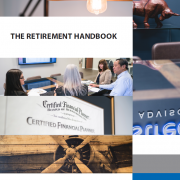When a Windfall Comes Your Way
When a Windfall Comes Your Way
What do you do with big money?
Getting rich quick can be liberating, but it can also be frustrating. Sudden wealth can help you address retirement saving or college funding anxieties, and it may also give you the opportunity to live and work on your terms. On the other hand, you’ll pay more taxes, attract more attention, and maybe even contend with jealousy or envy. You may also deal with grief or stress, as a lump sum may be linked to a death, a divorce, or a pension payout decision.
Windfalls don’t always lead to happy endings. Take the example of Alex and Rhoda Toth, a Florida couple down to their last $25 who hit a lottery jackpot of roughly $13 million in 1990. Their feel-good story ended badly: by 2006, they were bankrupt and facing tax fraud charges. Or Janite Lee, who won $18 million in the Illinois Lottery. Just eight years later, she filed for Chapter 7 bankruptcy; she had $700 to her name and owed $2.5 million to creditors. Windfalls don’t necessarily breed “old money” either – without long-range vision, one generation’s wealth may not transfer to the next. The Williams Group, a California-based wealth coaching firm, recently spent years studying the estate transfers of more than 2,000 high net worth households. It found that 70% of the time, the wealth built by one generation failed to successfully migrate to the next. (1,2)
What are some wise steps to take when you receive a windfall? What might you do to keep that money in your life and in your family for years to come?
Keep quiet, if you can. If you aren’t in the spotlight, don’t step into it. Who really needs to know about your newfound wealth besides you and your immediate family? The Internal Revenue Service, the financial professionals who you consult or hire, and your attorney. The list needn’t be much longer, and you may want to limit it at that.
What if you can’t? Winning a lottery prize, selling your company, signing a multiyear deal – when your wealth is publicized, expect friends and strangers to come knocking at your door. Be fair, firm, and friendly – and avoid handling the requests, yourself. One generous handout may risk opening the floodgate to others. Let your financial team review appeals for loans, business proposals, and pipe dreams.
Yes, your team. If big money comes your way, you need skilled professionals in your corner – a tax professional, an attorney, and a wealth manager. Ideally, your tax professional is a Certified Public Accountant and tax advisor, your lawyer is an estate planning attorney, and your wealth manager pays attention to tax efficiency.
Think in stages. When a big lump sum enhances your financial standing, you need to think about the immediate future, the near future, and the decades ahead. Many people celebrate their good fortune when they receive sudden wealth and live in the moment, only to wonder years later where that moment went.
In the immediate future, an infusion of wealth may give you some tax dilemmas; it may also require you to reconsider existing beneficiary designations on IRAs, retirement plans, and investment accounts and insurance policies. A will, a trust, an existing estate plan – they may need to be revisited. Resist the temptation to try and grow the newly acquired wealth quickly through aggressive investing.
Now, how about the next few years? Think about what financial independence (or greater financial freedom) means to you. How do you want to spend your time? Should you continue in your present career? Should you stick with your business, or sell or transfer ownership? What kinds of near-term possibilities could this open for you? What are the concrete financial steps that could help you defer or reduce taxes in the next few years? How can risk be sensibly managed as some or all the assets are invested?
Looking further ahead, tax efficiency can potentially make an enormous difference for that lump sum. You may end up with considerably more money (or considerably less) decades from now due to asset location and other tax factors.
Think about doing nothing for a while. Nothing financially momentous, that is. There’s nothing wrong with that. Sudden, impulsive moves with sudden wealth can backfire.
Welcome the positive financial changes, but don’t change yourself. Remaining true to your morals, ethics, and beliefs will help you stay grounded. Turning to professionals who know how to capably guide that wealth is just as vital.
Justin D. Rucci, CFP®
Wealth Advisor
Warren Street Wealth Advisors
Justin D. Rucci is an Investment Advisor Representative of Warren Street Wealth Advisors, a Registered Investment Advisor. The information contained herein does not involve the rendering of personalized investment advice but is limited to the dissemination of general information. A professional advisor should be consulted before implementing any of the strategies or options presented.
This material was prepared by Marketing Pro, Inc. Any investments discussed carry unique risks and should be carefully considered and reviewed by you and your financial professional. Past performance may not be indicative of future results. All investment strategies have the potential for profit or loss. Changes in investment strategies, contributions or withdrawals may materially alter the performance, strategy, and results of your portfolio. Historical performance results for investment indexes and/or categories, generally do not reflect the deduction of transaction and/or custodial charges or the deduction of an investment-management fee, the incurrence of which would have the effect of decreasing historical performance results. Economic factors, market conditions, and investment strategies will affect the performance of any portfolio and there are no assurances that it will match or outperform any particular benchmark. Nothing in this commentary is a solicitation to buy, or sell, any securities, or an attempt to furnish personal investment advice. We may hold securities referenced in the blog and due to the static nature of the content, those securities held may change over time and trades may be contrary to outdated posts.
Citations.
1 – bankrate.com/finance/personal-finance/lottery-winners-who-went-broke-1.aspx#slide=1 [5/23/18]
2 – money.cnn.com/2018/09/10/investing/multi-generation-wealth/index.html [9/10/18]








